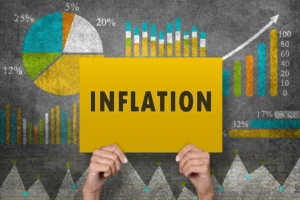Inflation rate in the UK: How rapidly are prices increasing?
In the 12 months ending in November, UK prices increased by 2.6%, the most in eight months. It indicates that for two consecutive months, inflation has exceeded the Bank of England’s target.
Inflation: What is it?

A general increase in the cost of goods and services over time is indicative of inflation, which is a slow decline in buying power. The average annual price increase of a basket of chosen goods and services is used to compute the inflation rate. Whereas low inflation indicates slower price growth, high inflation indicates faster price growth.
How Do Prices Get Affected by Inflation?
The overall effect of price fluctuations for a wide range of goods and services is what inflation seeks to quantify. It makes it possible to describe the rise in the level of prices for goods and services in an economy over a given period with a single value. One unit of money can purchase fewer products and services as prices rise.
The general public’s cost of living is impacted by this decline in purchasing power, which eventually causes economic growth to slow. Economists generally agree that persistent inflation happens when a country’s money supply expands faster than its economy.
How is the inflation rate in the UK calculated?

Food and gasoline prices are among hundreds of commonplace products that the Office for National Statistics (ONS) tracks. This virtual “basket of goods” is updated frequently to match current purchasing patterns; in 2024, vinyl records and air fryers were added, while hand sanitizer was taken out. The Consumer Prices Index (CPI), an external indicator of inflation, is the primary metric, and the most recent number is released each month.
From 2.3% in the 12 months to October 2024 to 2.6% in the year to November 2024, the CPI increased. The rate for November is the highest since March 2024.
The price increases for clothing and petrol were the main causes of this.
Why does raising interest rates contribute to a reduction in inflation?
The Bank of England raised interest rates to 5.25%, a 16-year high, when inflation was far higher than its target of 2%. The premise is that consumers will have less money to spend if borrowing becomes more costly. Additionally, people can be inspired to save more money. For instance, bigger savings offers may not always be worth the higher mortgage repayments faced by homeowners.
Additionally, companies are borrowing less, which reduces their likelihood of creating jobs. Some might reduce investment and staff.
Do wages increase in line with inflation?
Regular pay increased faster than anticipated between August and October, according to the most recent official quarterly numbers, which are external. The three-month period saw an average annual gain in wages (not including bonuses) of 5.2%, up from 4.8% from July to September. This increase, the first in over a year, indicates that salaries are rising far faster than inflation.
How have interest rates in the UK changed?
In 2024, the Bank of England lowered interest rates twice: once in August to 5% and once in November to 4.75%. In addition, the Bank takes into account external factors like “core inflation” when determining whether and how to adjust rates.
Since food and energy costs are sometimes highly volatile, core inflation excludes them to provide a more accurate picture of long-term trends. From 3.3% in the year to October, the metric increased to 3.5% in November. Andrew Bailey, the governor of the Bank, stated in October that if inflation stayed under control, the Bank may be a “bit more aggressive” in lowering borrowing prices.
